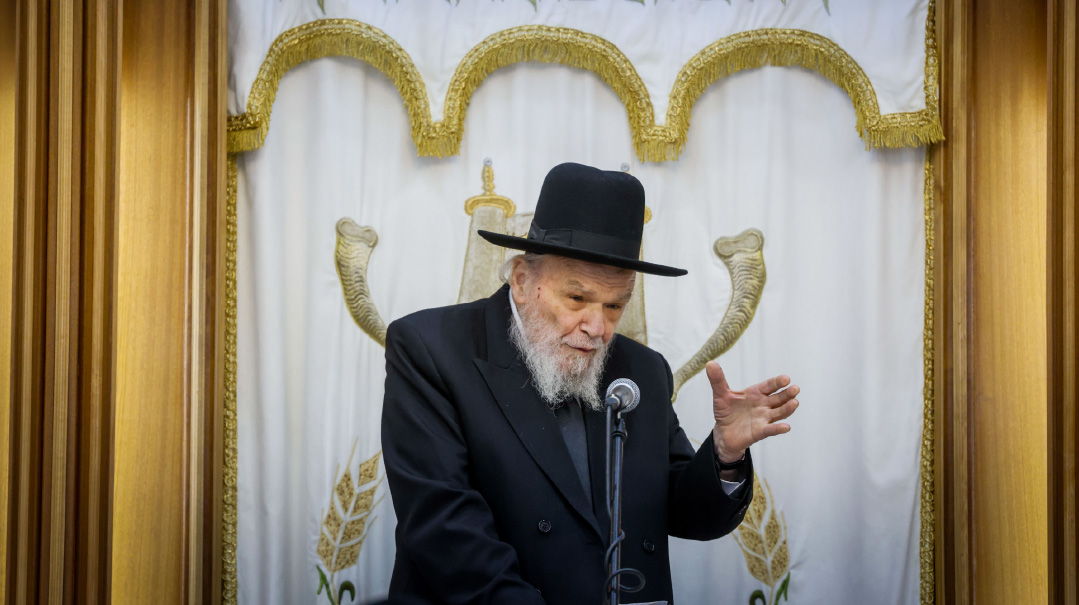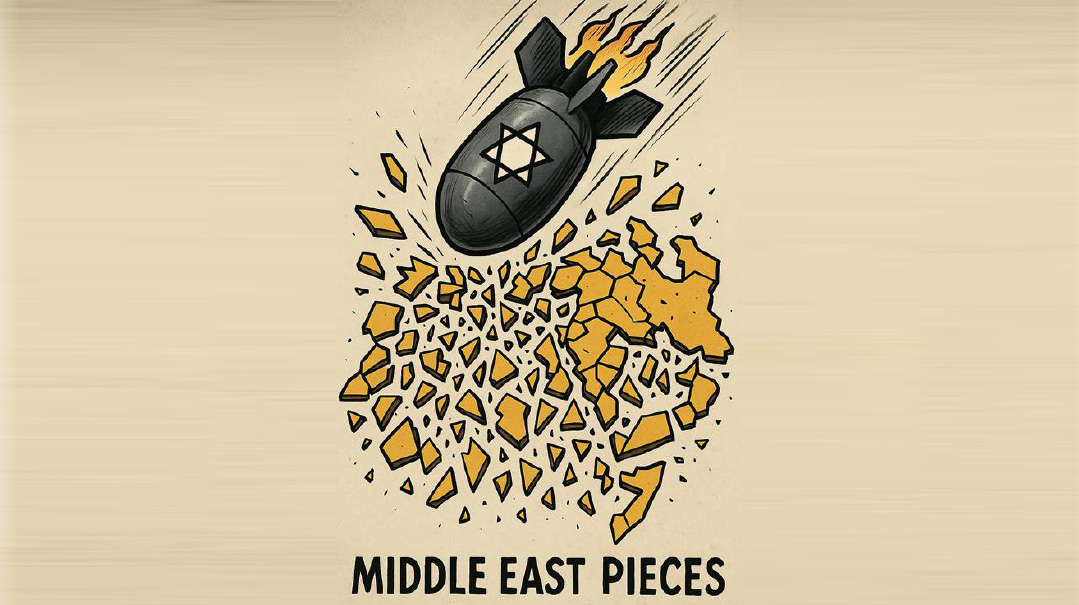Political Thrillah

It’s Mordechai and Esther’s docudrama... what they left out speaks volumes about the rise and fall of world events
F
rum newspapers are identifiable by a few markers — one of them, the absence of a sports section.
Officially, that is. In reality, they cover professional sports extensively. It’s just called politics.
The fervency with which Bochurim of All Ages (an official, internal Mishpacha classification, by the way) follow politics is confirmation of an anthropological fact: Humans, by nature, need spectator sports.
So if they don’t compete over a spherical or oval football, they’ll find a substitute — say, obsessing over who gets to carry the nuclear football.
Hence my skepticism whenever people say that they’re not interested in politics. What they mean is that they’re not interested in regular politics — with the honorable exception of anything involving Trump, which is irregular politics. Then interest suddenly blossoms in the most unlikely quarters.
“Host gehert vos iz geshein mit Greenland?” you hear the whispers in Zichron Moshe.
“Crazy about Trump’s Gaza plan, absolutely crazy — no?” is all the rage among the matrons of Golders Green and Boro Park.
Perhaps that’s part of the appeal of the Megillah — the political drama. Without detracting an iota from its holiness, which publisher would turn down a political thriller like this?
Megillas Esther has all the elements of a bestseller. A plot filled with palace intrigue, a wannabe dictator lacking political legitimacy, a rags-to-riches queen, blood running in the streets, a genocidal family strung up on the gallows, patriotic street parties, and a rabbi leading an empire into a virtuous future.
According to the Malbim, Achashveirosh’s drive for absolute, untrammeled power underlies the first few chapters — power that’s finally obtained when Vashti is executed.
Politics there’s aplenty in the Megillah — with one striking exception. Jewish politics is entirely absent. Read through the entire thing and there’s no hint that Jews have a p-for-politics chromosome.
Where are all the Jewish think tanks, the frum advisers, the Orthodox strategists? Why doesn’t Achashverosh have a pollster from the tribe, a yarmulke-wearing aide, epes a frum flunky?
It’s inconceivable that threatened with anti-Semitism, the askanim didn’t swing into action and arrange a grave, high-level strategy meeting. For sure the Jewish donors got on the phone and harangued the Palace, threatened to cut off their funding for Haman’s super PAC, or — perish the thought — support the other party if Achashverosh didn’t fall into line.
The Jewish media must have gone wild, quoting political insiders, scrambling for the scoop, not to mention a place in the Palace briefing room.
What about Mordechai? Did he just sit in the King’s Gate and say Tehillim, or did he, in tandem, use his diplomatic skills to find a way to avert the crisis? It’s hard to believe that the statesman that we find at the end of the Megillah successfully steering the behemoth of an empire, didn’t try every available avenue, utilizing his knowledge of 70 languages to talk to every high official in the land to battle the genocidal decree.
And yet, none of that appears. Crickets, nada, gornisht. In the final analysis, Charvonah walks away with a zachur latov for his cameo, but all the Shushan consultants, the highly paid strategists, the tycoons, political insiders, fixers, and media briefers get nothing at all.
Why is that?
Ultimately, because for all the attention paid to them at the time, they didn’t matter. Not only in the final result, but also in the greater scheme of things.
In real time, of course, it was right to explore any political avenue to save the Jewish people. The lobbyists needed to lobby, the strategists to strategize. We give that type of thing a name: hishtadlus.
In real time as well, people might well have pointed to the machers and tycoons and thought to themselves that it was good that there were Jews in high places. They would have gotten lots of airtime in the fevered discussions at kiddush clubs up and down the land.
As for the Tehillim zoggers of the Shushan shtiblach, the unnoticed Jews quietly doing teshuvah — people might have thought “Nu,nu — of course, of course. Very sweet.”
That’s where the Megillah bangs loudly on the table. It’s Mordechai and Esther’s docudrama, and they wrote the credit roll. And what they left out speaks volumes about the rise and fall of world events.
In highlighting the Tehillim zoggers, and eliding the desperate political effort to save the Jewish People, the message is that what dominated the newsrooms of Persia was not the real picture.
It’s not that hishtadlus doesn’t matter; of course it does. It’s just that like all events, Haman’s rise and fall were decreed on high. In those realms, political genius has no currency — only plain old teshuvah, tefillah, and tzedakah matter.
With appropriate sentiments of l’havdil¸ such historical reassessment happens all the time in the secular realm. Published in 1948, Churchill’s mammoth history of World War II omits some of the wartime leader’s pet projects, such as his championing of special forces.
Churchill had the soul of a warrior — he liked nothing better than a good commando raid, preferably with cutlasses between the teeth. He was personally responsible for the proliferation of bearded raiders and daredevil misfits in the British Army during the war.
In real time, these photogenic heroes occupied an outsize proportion of his time, and Churchill himself saw them as a potent propaganda tool.
But when it came time to write the history of the conflict — to assess the impact of it all by the cold light of realism — these romantic figures received little credit. Wars, Churchill knew, are won by masses of well-disciplined infantry, not by spectacular swagger.
What receives adulation when events are hot is often relegated to a footnote when it’s all over.
Without overdoing parallels to the Purim story, here we are thousands of years later with some significant challenges of our own, involving genocidal Persians.
We also have some powerful Jews and other friends in high places, who we obsess over — naturally in first-name terms.
It’s good to have Steve on board, we say — he was Ruby’s partner in real estate. What does Elon taineh? Is J.D. still on our side? Pity about Tucker and Candace, but — chasdei Hashem — we have Ben in our corner. Real Gemara kop — he plays the Left like a violin.
In short, we’re not lacking brilliant political minds, money and influence, and that occupies one half of our brain. The other half knows that there’s another story entirely — that of Mordechai, his schoolchildren and the spiritual battle for the future of the Jewish people.
Left brain, right brain — we struggle to reconcile our two outlooks. We believe in the world of tefillah, but we live in the world of action.
That’s where the Megillah steps in. There’s no contradiction, it says. Just like when we go to work, we know not to believe that our own cleverness makes the difference; so it is with world events.
Ultimately, when the Trump era gives way to the next trend, as history moves inexorably on, we’ll see what Mordechai and Esther perceived so clearly.
That beyond the din and fury of current events, there’s another dimension where it’s all decided. It’s the quiet Tehillim Jew in each one of us — that half of us that knows the truth — who will be remembered by our history.
(Originally featured in Mishpacha, Issue 1053)
Oops! We could not locate your form.




